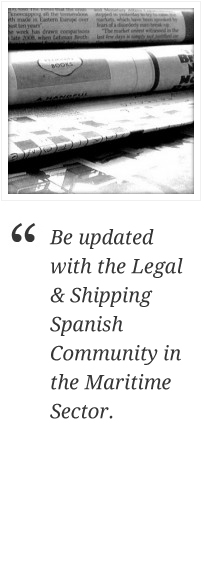April: CIRCULAR 9A/2001
TO SHIPOWNERS / LINES CALLING TO SPANISH PORTS:
VESSELS’ DETENTIONS, SANCTIONING PROCEEDINGS AND LETTERS OF GUARANTEE FOLLOWING PORT STATE CONTROLS IN SPANISH PORTS
Increased inspections in Spain reflect the growing concern of the Spanish government with regard to stricter port controls in an attempt to reinforce shipping safety. In fact, Spain is the EU State reporting a higher number of vessels’ detentions following port State inspections.
As already informed in our Circular 4/A 2000, foreign vessels calling to Spanish Ports are inspected according to the provisions stated under the Royal Decree 768/1999 referred to vessels’ compliance with the international standards on safe navigation, prevention of pollution, work and life conditions on board recently modified by Royal Decree 1828/2000.
The inspection of a minimum of 25% of vessels calling to Spanish Ports or entering into the Spanish jurisdiction area will be focused on:
- Checking of all the required certificates and documents that the vessel should have on board according to the International Conventions standards.
- Examining the general conditions of the vessel, specially the engine room, accommodation and hygiene.
If the Inspector considers that there is enough evidence that the condition of the vessel does not reach the international standards, he will proceed with a more detailed inspection which will include the control of the operational conditions of the vessel. Once the inspection has finalised, the Inspector will deliver to the Master a Certificate stating: a) The results of the inspection and, b) Those measures that the Master / operator / shipowner should adopt to continue with a safe navigation. If the Inspector considers that the vessel should be immobilised until the measures have been complied with by the vessel, this specification will also appear in the Certificate.
It is important to note that the non-compliance with the requirements of the inspection can be easily typified as an administrative infraction as per the Royal Decree 768/1999’s remission to Spanish Ports and Merchant Marine Law 27/1992 which regulates Sanctioning Proceedings, Infractions and Fines.
The fine against the vessel would depend on the type of infraction and could be up to:
- Ptas. 10,000,000 (Euro 60,101) for a small infraction (the non-compliance of the law or of the instructions given by the competent authorities on shipping safety or pollution)
- Ptas. 20,000,000 (Euro 120,202) for a severe infraction (the lack, deterioration or grave inaccuracy of the regulation documentation of the vessel).
- Ptas. 50,000,000 (Euro 300,506) for a very severe infraction against the “ordenación†of the maritime traffic (e.g. vessel’s regulation certificates being expired).
- Ptas. 150,000,000 (Euro 901,518) for a very severe infraction against the shipping safety (navigation without the vessel having the necessary seaworthiness conditions, therefore endangering her safety).
The Sanctioning Proceeding is initiated by the General Directorate of the Merchant Marine, through the Harbour Master office of the port, who will notify the Master of the vessel the initation of sanctioning proceedings detailing the alleged infraction as per Spanish Law and providing 15 days to the Master and the shipowners/operators to present points of defence and provide evidence. Even though a good knowledge of the law and of this type of proceeding is necessary, the points of defence do not need to be signed by a lawyer. In order to avoid time and costs, power of representation can be directly signed by the Master of the vessel whilst in port.
Together with the decision to initiate sanctioning proceedings, the Harbour Master will usually adopt a preventive measure to guarantee the payment of the possible sanction. This measure is the detention of the vessel, and the only way to release the vessel is by providing a guarantee.
Following a 1997 Spanish law, Club letters of undertaking (if the Club has agreed to provide a LOU) are normally not acceptable in Spain as a matter of law for detention claims following port state controls (same as pollution and stowaway claims). This law provides for the type of guarantees that are acceptable: cash money, letters of guarantee issued by banks, credit insurance companies and treasury bonds within others, and it also provides for the required text for each different type of guarantee.
In the event of an inspection incident where a vessel is detained, delays may be expected while the provision of the guarantee is being arranged. A good knowledge of the procedure to be followed before the various Spanish authorities involved (Treasury Department, State Attorney Department and Harbour Master) and a good knowledge of the required text of the guarantee depending on the type of guarantee to be presented, will mean a small delay to the vessel. A bad knowledge of the previous will mean an avoidable longer delay.
Should any Members / operators / shipowners have any queries or problems related to vessel detentions or immobilisations at any Spanish port, they should not hesitate to contact us.

